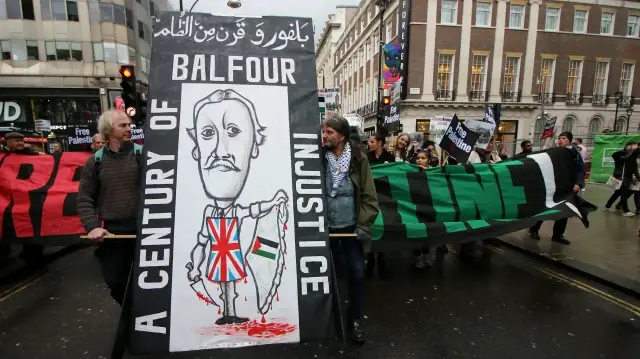Balfour and the abolition of the Caliphate, or the establishment of Israel and the awakening of Islamic unity

There has always been a close historical correlation between the establishment of the State of Israel and the Muslim world losing its caliph. The Balfour Declaration, which foresaw the creation of a Jewish state in Palestine, also carried the understanding and the reality that this would not be possible as long as the Caliphate existed. That’s why one stage of the process that led to the founding of Israel required the abolition of the Caliphate.The fact that all the key actors responsible for the failures on the Palestinian front later became leading figures in the new political order created after the abolition of the Caliphate is a relationship that needs to be followed within the continuity of this story. Seen from this angle, the long-standing silence on the failures—almost only explainable by intent—of Ottoman officers in Gaza after Balfour, and later in the fall of Jerusalem, becomes far less mysterious.
It’s a familiar story: those who joined the ranks of the victors also destroyed the institutions that could hold them accountable for the defeat they themselves helped create, thereby assigning themselves an honorable, triumphant role. The defeat of Gaza in the third British assault—after resisting the first two attacks heroically and nobly, just like today—was clearly not due to the weakness of its brave defenders, but to the failures of those commanding them.
What value could there be in withdrawing and surrendering Jerusalem to the British without any resistance, supposedly just so its historic, spiritual, cultural, and architectural fabric would not be harmed by war? Yet even this was presented as some kind of noble gesture. But in reality, everything was unfolding exactly according to the script written by those who issued the Balfour Declaration—and certain figures within the Ottoman army were playing the roles assigned to them.
We also know that until 1948, when the State of Israel was established, Türkiye pursued a policy of complete indifference toward these lands. No claim was made, no concern was carried. Myths about “Arab betrayal” were fabricated to conceal much greater betrayals, and the public was led to adopt a sort of national resentment as the justification for neglecting the region. In May 1948, when Israel was founded, Türkiye—at a time when the people had no say under single-party rule—became one of the first countries to recognize Israel in March 1949. As with all CHP policies: “despite the people.”
At that time, did the public even have the strength to object to any policy?
THE ESTABLISHMENT OF ISRAEL AND THE AWAKENING OF THE IDEA OF THE MUSLIM WORLD
While a correlation emerged between the decision to establish Israel and the abolition of the Caliphate, destiny had its own irony: the establishment of the State of Israel also coincided with a revival of the long-broken idea of a unified Islamic world. With the abolition of the Caliphate leaving the Muslim world headless and dismembered, the idea of Islamic unity began to reawaken with the creation of the State of Israel. We already mentioned that the vacuum created after the abolition of the Caliphate gave rise to transnational civil society responses throughout the Islamic world, such as the Muslim Brotherhood and Jamaat-e-Islami. The first of these, in particular, distinguished itself by sending volunteers to the front in every war known as an Arab war against Israel.
At the state level, too, Israel—with all the malign nature it carried—ended up being a vehicle for some good. King Faisal of Saudi Arabia, by stepping up to represent the outrage of Muslims worldwide after the arson attack on Al-Aqsa Mosque and by convening the Islamic Conference (OIC), ensured that Islam and Muslims re-entered global political discourse as a new axis in the post-Caliphate world order. This structure, later renamed the Organisation of Islamic Cooperation (OIC), still falls short of expectations today, but it reminded many Muslim-majority countries—most of which had fallen into colonial conditions after the Caliphate—of their duty to represent their Muslim populations, values, and aspirations.
The weaknesses shown in fulfilling this duty are now a test and an issue of accountability for these governments. It’s not much, but it is still a meaningful pressure. It’s a basic sociological rule: attacks awaken group identity and strengthen solidarity and cohesion. Zionist Israeli aggression and the never-yielding Palestinian resistance have continuously nourished this sentiment. Thanks to this, even Muslim-majority African countries—whose ties with the broader Islamic world had been weak even during the Caliphate—became engaged with the idea and networks of Islamic unity.
THE OIC PULLED MORE THAN 30 AFRICAN COUNTRIES AWAY FROM ISRAEL AND INTO ISLAMIC COOPERATION
From the moment it was founded, especially throughout the 1950s and 1960s, Israel played an extremely active role in Africa by leveraging its close ties with the West and its discourse on “development and agricultural cooperation.” Tel Aviv established diplomatic relations with more than 30 African countries, provided technical and educational assistance, and supported some newly independent regimes. In contrast, Arab–African relations remained limited.
The biggest shift came after the October 1973 War. The war was a turning point for African countries in understanding the nature of the Arab–Israeli conflict. Under the orders of King Faisal bin Abdulaziz, the Arabs used oil as a weapon to pressure Western countries supporting Israel, highlighting Arab economic and political power.
African countries concluded that their interests lay in aligning with the Arab–Islamic bloc rather than maintaining relations with Israel, which they saw as an enemy of their peoples—including Africans and the wider Global South.
As a result, more than 25 African countries cut diplomatic ties with Israel between 1973 and 1974 in solidarity with the Arab position. The leading examples included Chad, Uganda, Niger, Mali, and Congo. After 1973, membership in the OIC, founded in 1969, rapidly increased among African states. Countries such as Senegal, Guinea, Mali, Nigeria, Niger, Chad, Sudan, Somalia, Gambia, and Sierra Leone joined the organization.
The motivations were not only religious but also political and strategic: strengthening cooperation with the Islamic and Arab worlds, accessing economic support from Arab and Islamic funds (such as the Islamic Development Bank or the Kuwait Fund), and obtaining diplomatic protection against Western or Israeli pressure.
In turn, after widespread boycotts, most Israeli embassies in Africa were shut down. Israeli technical aid diminished and was replaced by Arab and Islamic support through development programs. However, after signing peace agreements with Egypt and later the Oslo Accords, Israel gradually sought to regain influence on the continent throughout the 1980s and 1990s.
Today, after October 7, Israel—by proving once again through genocidal aggression that it poses a threat to the entire Muslim world—is further fueling the idea of Islamic unity. While trying to bury it completely, it has awakened a sleeping giant. That is its own doing.
Reklam yükleniyor...
Reklam yükleniyor...








Comments you share on our site are a valuable resource for other users. Please be respectful of different opinions and other users. Avoid using rude, aggressive, derogatory, or discriminatory language.